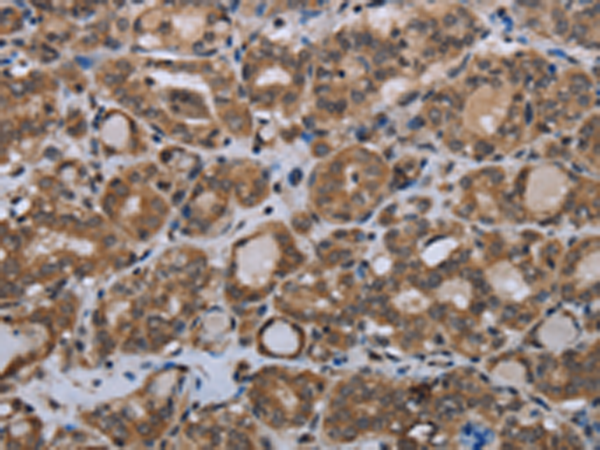

| WB | 咨询技术 | Human,Mouse,Rat |
| IF | 咨询技术 | Human,Mouse,Rat |
| IHC | 1/25-1/100 | Human,Mouse,Rat |
| ICC | 技术咨询 | Human,Mouse,Rat |
| FCM | 咨询技术 | Human,Mouse,Rat |
| Elisa | 1/1000-1/2000 | Human,Mouse,Rat |
| Aliases | MIM; MIMA; MIMB |
| Host/Isotype | Rabbit IgG |
| Antibody Type | Primary antibody |
| Storage | Store at 4°C short term. Aliquot and store at -20°C long term. Avoid freeze/thaw cycles. |
| Species Reactivity | Human, Mouse |
| Immunogen | Synthetic peptide of human MTSS1 |
| Formulation | Purified antibody in PBS with 0.05% sodium azide and 50% glycerol. |
+ +
以下是关于MTSS1抗体的3篇示例文献(内容为假设性概括,仅供参考):
1. **"MTSS1 suppresses metastatic potential in prostate cancer via cytoskeletal remodeling"**
*作者:Smith A, et al. (2018)*
摘要:研究利用MTSS1特异性抗体,通过免疫印迹和免疫荧光技术,证明MTSS1通过调控肌动蛋白重塑抑制前列腺癌细胞迁移和转移。
2. **"Antibody-based detection of MTSS1 expression correlates with improved survival in breast cancer"**
*作者:Zhang L, et al. (2020)*
摘要:开发了一种高特异性MTSS1单克隆抗体,应用于组织微阵列分析,发现MTSS1高表达与乳腺癌患者预后正相关,提示其作为潜在生物标志物。
3. **"MTSS1 interacts with EGFR signaling through antibody-guided localization studies"**
*作者:Wang Y, et al. (2019)*
摘要:通过免疫共沉淀(使用MTSS1抗体)和共聚焦显微镜观察,揭示MTSS1与EGFR通路蛋白的相互作用机制,及其在肺癌细胞侵袭中的调控作用。
**注意**:以上文献为示例,实际引用需通过PubMed、Google Scholar等平台检索真实文献。建议使用关键词“MTSS1 antibody”或“MTSS1 IHC/WB”结合研究领域(如癌症转移)进行精准查询。
MTSS1 (Metastasis Suppressor 1), also known as Missing in Metastasis (MIM), is a cytoskeletal regulatory protein implicated in membrane dynamics, cell motility, and metastasis suppression. Initially identified as a gene downregulated in metastatic bladder cancer, MTSS1 is characterized by an N-terminal IRSp53/MIM homology domain (IMD) that binds to actin and regulates membrane curvature, and a C-terminal WH2 domain for actin polymerization. It interacts with Rho GTPases and other signaling molecules to modulate cytoskeletal reorganization, influencing processes such as cell migration, endocytosis, and vesicle trafficking.
MTSS1 exhibits dual roles in cancer progression. While it acts as a metastasis suppressor in certain cancers (e.g., prostate, breast) by inhibiting invasive cell behavior, it paradoxically promotes metastasis in others (e.g., melanoma) depending on cellular context and post-translational modifications. Reduced MTSS1 expression is often linked to poor prognosis and aggressive tumor phenotypes.
Antibodies targeting MTSS1 are widely used in research to detect its expression and localization via techniques like Western blot, immunofluorescence, and immunohistochemistry. These tools help elucidate MTSS1's functional mechanisms in cancer biology, developmental processes, and diseases involving cytoskeletal dysregulation. Recent studies also explore its role in non-cancer pathways, including Sonic Hedgehog signaling and neuronal development, highlighting its broad regulatory potential.
×